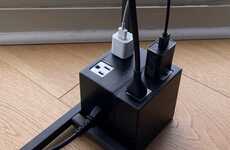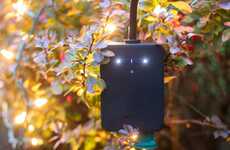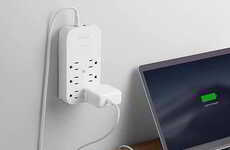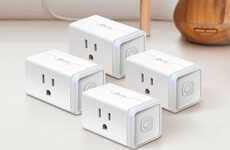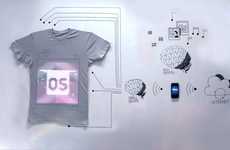
The Sony 'Authentication Power Outlet' Can Determine Power Useage
Sarah Moore — March 22, 2012 — Eco
References: trendhunter
The Sony 'Authentication Power Outlet' prototype uses the company's patented FeliCa technology to register which appliances are plugged into the device, as well as identifying who is using what. Sony's new system is comprised of a specially designed power outlet wall panel that can read and write data, a plug attachment and a small tablet-sized screen to display the information collected.
The super-smart power outlet uses a RFID smart card that can be swiped to identify who is using the outlet, and a FeliCa Lite chip that determines what devices are being used and how much power they are consuming. When an appliance or electronic device is inserted into the special plug attachment, the amount of power used is recorded onto the chip and transferred onto the screen.
The Sony Authentication Power Outlet will help users conserve energy by determining which devices are the most power-draining, and turning them off during non-essential times.
The super-smart power outlet uses a RFID smart card that can be swiped to identify who is using the outlet, and a FeliCa Lite chip that determines what devices are being used and how much power they are consuming. When an appliance or electronic device is inserted into the special plug attachment, the amount of power used is recorded onto the chip and transferred onto the screen.
The Sony Authentication Power Outlet will help users conserve energy by determining which devices are the most power-draining, and turning them off during non-essential times.
Trend Themes
1. Smart Power Outlets - There is an opportunity to develop improved versions of the Sony Authentication Power Outlet that use internet of things technology to communicate with other household devices and learn from user behaviors.
2. Energy Monitoring Devices - There is an opportunity to develop more sophisticated monitoring devices that integrate with a variety of different types of appliances and use big data analysis to identify energy-saving patterns.
3. Smart Home Automation - There is an opportunity to develop smart home automation systems that can be controlled from a central hub and automate the management of lighting, heating and cooling, and other appliances.
Industry Implications
1. Home Appliances - The home appliances industry could benefit from developing smart appliances that automatically adjust their energy usage based on usage patterns.
2. Building Automation Systems - Developing building automation systems with energy-saving features could have significant impact on energy conservation.
3. Saas Energy Management Platforms - Energy management software as a service (SaaS) providers could offer enhanced energy management platforms to monitor and optimize energy usage across many devices.
2.5
Score
Popularity
Activity
Freshness

